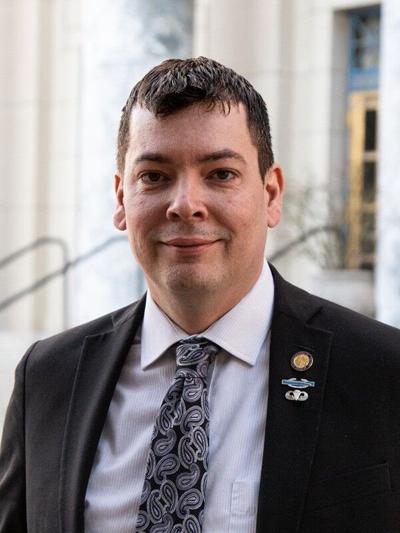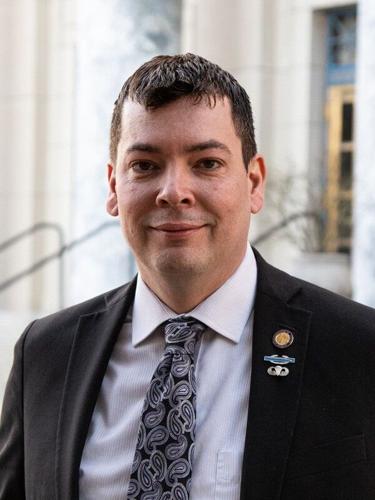State Rep. Will Stapp is seeking reelection to Alaska House District 32, an office he has occupied since 2022.
Originally from the Seattle suburb of Kirkland, Stapp moved to Alaska in 2006 after he enlisted in the U.S. Army. He was stationed at Fort Wainwright Army Base and served two tours in Iraq.
In 2007, he was wounded by shrapnel for which he received the Purple Heart. After his military service, he got into the insurance game and had to choose between living in Fairbanks or Anchorage.
“I chose to come back to Fairbanks,” he said.
Stapp said it was the hospitality of a woman who opened her home, which was actually a converted school bus, to him and another soldier during their first Christmas in Alaska.
“I didn’t even know people could live in buses,” Stapp said. “It takes a special kind of person to have a giving heart like that.”
For Stapp, his goal as a lawmaker is to encourage economic growth in Alaska.
“I have three kids — a 6-year-old daughter, a 3-year-old daughter and a 1-year old son,” he said. “My wife’s Alaska Native, my kids are Alaska Native, and I would like them to be able to grow up in their ancestral homeland and have the economic opportunities to not only afford to live in the state, but actually be productive members of the state.”
What should the state’s budget priorities be?
Responsible budgeting should be the foremost priority. During my time serving on the Finance Committee we have passed two balanced budgets, neither of which required a draw from Alaska’s savings accounts to fund expenditures. A responsible budget should prioritize education, public safety, and delivering cheaper energy to Alaskans, ensuring that we have a strong foundation to build a brighter future. Not only should certain things be prioritized in the budget in terms of funding, but wasteful government excess should be cut.
Last session, I authored HB 260, which aimed to eliminate a program that served zero Alaskans for the past three years, despite being funded by the state each year. Though HB 260 passed the House by a wide margin, it failed to reach the finish line in the Senate. I believe that people want their government to be as efficient as possible, prioritize core functions, and eliminate waste and excess where practicable.
Education funding was a top concern in the state last session. How would you support education at the state level?
In life you prioritize what you value, education funding and measures designed to improve student achievement have been priorities of mine and my record in Juneau reflects these values. Though SB 140 did not survive the veto pen, a substantial funding increase in education (albeit temporary) was enacted in the FY 25 Budget. My goal remains to continue to work tirelessly to achieve a permanent and stable funding increase for our schools that helps students, teachers, and support staff achieve accountable success not only in the classroom, but in the workforce. This can be achieved within the framework of responsible budgeting and as the old saying goes, if at first you don’t succeed, try, try again.
What steps can the state take to support available housing?
The most impactful way would be to gear policies and investment toward the cost drives of housing on the front end as opposed to subsidizing back end. Housing in Alaska is expensive because the construction, land in some areas, and labor costs to build housing are expensive. Investment in cheap energy designed to deliver substantially lower heat and power cost to residents will in turn lead to diversification in Alaska’s private sector economy. Ideally if the inputs are cheaper the market economics of domestically produced building materials would be cheaper than imports thus lowering the cost of housing. Increases in the construction of new units at lower cost will create a more affordable housing environment.
What role do national culture war topics have in the Alaska Legislature?
“Just because you do not take an interest in politics doesn’t mean politics won’t take an interest in you.” This saying, often attributed to Pericles, underscores a crucial point: culture war topics are here to stay, regardless of one’s opinion. If the Legislature attempts to bury its head in the sand, the courts or the administration will step in and act.
How would you work across the aisle with other lawmakers? Would you join a bipartisan Coalition?
I have a proven track record of collaborating effectively with those I politically disagree with to achieve shared goals. Even when I strongly oppose certain issues, I maintain productive relationships with my colleagues. The key for me is to always remember that, at the end of the day, people are people. By treating others with respect as a rule rather than an exception, I’ve found that most folks are amicable. I currently serve in the House Majority, which is a bipartisan coalition.
How should the state address outmigration and make Alaska more attractive to potential residents?
Affordability and opportunity. There is no magic bullet that would end outmigration but lowering the cost of living via investment in cheap energy would go a long way into mitigating our outmigration problem. Cheaper heat and power costs would leave more capital for individuals and business alike to make more investments. At risk of sounding redundant it is a simple answer, though not an easy one as it requires substantial investment.
With a shortage of available natural gas in Cook Inlet and the lack of a pipeline to the North Slope, how would you address high energy costs in the Interior?
I lead the efforts last session on making a substantial investment into the Interior Gas Utility for main line expansion. The more Interior residents that switch over to more affordable natural gas will have the added benefit of lowering the overall costs to residents. Next year, for the first time in our history, North Slope gas will be used domestically outside the North Slope. Ideally, this coupled with the shortage of gas in Southcentral will push the governor and other legislators into action on a gas pipeline for domestic use.
The main resistance to a gas pipeline has always been the cost and it is my goal to have the governor and the legislature conduct a proper cost benefit analysis of long-term LNG imports versus construction of an in-state line for domestic use. Energy diversification in renewables can help stem the tide of cost increases, but they alone will not act as a reliable replacement for Coal, Oil or Natural Gas.
What are your thoughts on ranked choice voting?
There are several examples of states transitioning from first-past-the-post voting to some type of majority voting. I take issue with how Ballot Measure 2 was designed, as it uses what I believe is the worst method for a ranked choice system: Instant Runoff Voting (IRV). I would prefer an actual runoff election, Borda count, or even a Condorcet method. I don’t have an issue with a more open primary system or even some form of a runoff to achieve a majority outcome. However, I dislike our current system and will be voting for repeal because it seems designed to engineer election outcomes before people cast their votes. This is a bold statement, yet my fear is that this problem will worsen each cycle if the current system is not repealed.
Currently, the top four candidates always advance to a general election, and nothing prevents candidates who don’t share the values of a political party from running under that party’s banner.
What would you do to foster a northern rail extension?
Since I have lived in Alaska, I have heard politicians promise the rail extension to voters, yet they have all failed to deliver. The northern rail extension comes with a massive price tag, and to further its development, we need to identify far higher quantities of rail tonnage that would utilize the extension. As a legislator, I have worked with stakeholders to push this project forward. The more mining and agricultural opportunities it can unlock, the more viable its construction becomes.
I support the extension, but identifying funding sources in the 1 billion or more dollar range to get the rail just to Delta Junction is a difficult, though not impossible, task. The best way to foster development going forward is to press our federal delegation to get the Department of Defense to make a financial commitment to the rail extension as we continue to identify more tonnage volume in the region for rail use.


